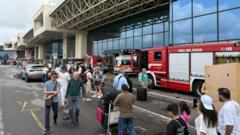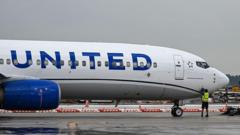Heathrow is among several European airports hit by a cyber-attack affecting an electronic check-in and baggage system.
The airport warned of possible delays due to a technical issue affecting software provided by Collins Aerospace to several airlines.
Brussels Airport reported that a cyber-attack on Friday night resulted in passengers being checked in and boarded manually, while Berlin's Brandenburg Airport also faced longer waiting times due to the problem.
RTX, which owns Collins Aerospace, acknowledged a cyber-related disruption at select airports and is working to resolve the issue as quickly as possible.
The impact was limited to electronic customer check-in and baggage drop, but manual operations have been implemented to mitigate it.
The attack affected the Muse software that coordinates check-in processes among different airlines.
While British Airways is reportedly operating normally with a back-up system, most other airlines at Heathrow have been impacted, resulting in hundreds of delayed flights.
Passengers have expressed their frustration, with reports of multi-hour queues and missed connections, especially affecting those attempting to check in for long-haul flights.
Authorities are keeping a close watch on the situation, with additional staff deployed to assist in check-in areas.
Transport Secretary Heidi Alexander indicated that she is monitoring the situation closely.
EasyJet and Ryanair, not directly affected, continue to operate as normal.
As disruptions mount across multiple airports, industry analysts warn of the interconnected nature of air travel and the potential cascading effects of such incidents.
Cybersecurity analysts are investigating the nature of the attack, with speculation around ransomware involvement, though no definitive link to state-sponsored hackers has been confirmed.
This incident serves as a stark reminder of the vulnerabilities within airport operations in an increasingly tech-dependent world.




















